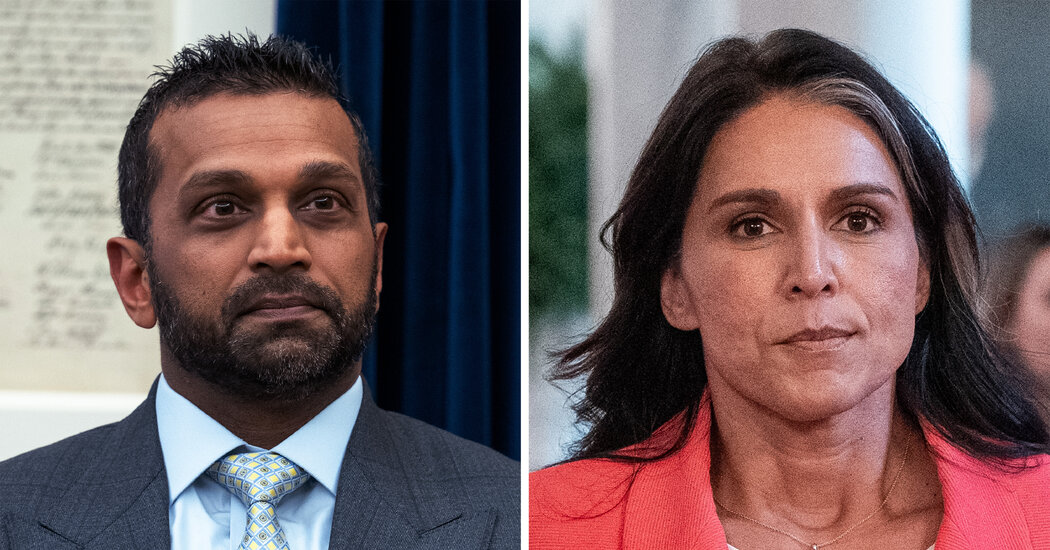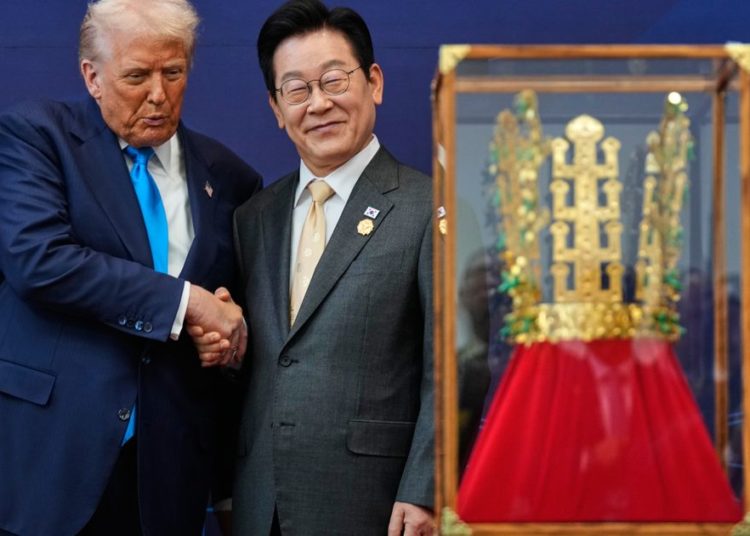The F.B.I. informed Congress last week that it “strongly” opposed a proposal to make the Office of the Director of National Intelligence the lead counterintelligence agency for the federal government, bringing into public view a rift among top national security officials.
The disclosure, made in a pointed and unusual letter obtained by The New York Times, underscored the broader concern at other agencies, including the F.B.I., over a House bill that would empower Tulsi Gabbard, the director of national intelligence, to play a more prominent role in counterintelligence issues.
It also appeared to be an effort to undercut Ms. Gabbard, who planned to endorse the change in a separate letter, given that the bill would step into what has typically been the bureau’s purview.
The F.B.I. letter was the latest example of tensions between Ms. Gabbard and her counterparts at other intelligence agencies, including the director of the F.B.I., Kash Patel. A bid by Joe Kent, a top Gabbard ally who leads the National Counterterrorism Center, to investigate the circumstances of the conservative activist Charlie Kirk’s killing had already raised alarms at the F.B.I., after Mr. Kent went so far as to examine the bureau’s files.
The House and Senate are negotiating over a final version of an intelligence policy bill, known as the Intelligence Authorization Act, and the proposal to overhaul counterintelligence operations, including the level of Ms. Gabbard’s involvement, remains one of the main sticking points, congressional officials said.
The F.B.I., in its letter, described the draft letter from Ms. Gabbard’s office as saying that the entire intelligence community supported the proposals that would give it primacy on counterintelligence issues.
Ms. Gabbard’s letter has not been sent to lawmakers, and The Times has not seen the draft. Officials from her office have shared their views on the proposal with the Office of Management and Budget, according to a person briefed on the matter who spoke on the condition of anonymity to describe internal deliberations.
Before weighing in on pending legislation, the Office of the Director of National Intelligence normally collects responses from various intelligence agencies, then sends a single letter to the House and Senate Intelligence Committees. An intelligence official claimed that Ms. Gabbard’s draft acknowledged that agencies, including the F.B.I., disagreed with the proposed changes.
The F.B.I. letter is unsigned, but administration officials said it would not have been sent without the approval of Mr. Patel. It pushes back against a handful of counterintelligence functions that Ms. Gabbard would effectively take over, using language like “vigorously disagrees with” and “strong objection.” One of the changes, the letter said, would “cause serious and long-lasting damage to the U.S. national security.”
In a joint statement, the F.B.I. and Ms. Gabbard’s office said they were “united in working with Congress to strengthen our nation’s counterintelligence efforts.”
Even as the intelligence community official criticized the F.B.I. letter as a “pre-emptive response,” the official said that a “healthy debate” among agencies was necessary to protect national security. The government’s counterintelligence operation was poorly coordinated and disjointed, the official argued.
Counterintelligence is a broad term that reflects the hunting of foreign spies — primarily the remit of the F.B.I. — and stopping leaks from insiders, which is the responsibility of various spy agencies.
The Office of the Director of National Intelligence has broad oversight of all intelligence agencies, several of which are dedicated to counterintelligence. But it exerts relatively little supervision over the F.B.I.’s spy hunters.
In practice, the House proposal would give Ms. Gabbard authority over all counterintelligence work conducted by the country’s spy agencies, officials briefed on the dispute said.
Critics of the House provision said it would effectively establish a counterintelligence czar who would have broad authority over the F.B.I. Such oversight, F.B.I. officials believe, would slow and complicate their work.
The C.I.A. and military counterintelligence officials also voiced concerns with the plan to increase Ms. Gabbard’s role, according to people familiar with the dispute.
Congressional officials said that lawmakers and national security officials broadly agreed that counterintelligence efforts needed to be nimbler. But it remains unclear whether the House provision would improve those efforts or simply add a layer of bureaucracy.
Supporters of the House legislation said that the F.B.I.’s objections were overstated, and that the bill would merely enhance the authorities of Ms. Gabbard’s National Counterintelligence and Security Center, which is responsible for warning businesses of counterintelligence threats from China and other foreign powers. (On Wednesday, the House committee on China endorsed the overhaul, arguing that the United States must adopt a new approach “to anticipate, disrupt, and outmaneuver foreign espionage networks before they strike.”)
Others disagreed.
Senator Mark Warner of Virginia, the top Democrat on the Intelligence Committee and a persistent critic of Ms. Gabbard, said the proposal to expand her office’s power was misguided. Ms. Gabbard was dismantling key functions of her office, like election security, he added, while jostling for operational control of intelligence agencies.
“That’s not what O.D.N.I. was created for, and it puts it in direct tension with the agencies it’s supposed to support,” Mr. Warner said. “This approach risks creating turf battles and undermining the effectiveness of our intelligence community.”
As the House Intelligence Committee approved the policy bill, Representative Rick Crawford of Arkansas, the Republican chairman of the panel, discussed the need to overhaul U.S. counterintelligence operations.
“While our adversaries in the Chinese Communist Party, Russia, Iran and terrorist groups operate on a war footing against the United States, too often we have remained reactive, complacent and risk averse,” he said.
Unlike the House legislation, the Senate legislation asks Ms. Gabbard to outline what counterintelligence activities could be consolidated in the F.B.I. and which smaller agencies she should manage.
Mr. Warner said the F.B.I.’s role as the country’s lead counterintelligence agency needed to be improved, even if there was value in having Ms. Gabbard’s office provide “strategic coordination.”
“My view has always been that any changes should be measured and deliberate, and done in a way that doesn’t disrupt ongoing operations,” Mr. Warner said.
A House Intelligence Committee spokeswoman said she would not comment on the debate between the House and Senate, but that counterintelligence reform remained a “top priority” for Mr. Crawford.
Some Senate Republicans and Trump administration officials believe that the Office of the Director of National Intelligence, created after the Sept. 11 attacks, has already become too unwieldy, and that its remit should be pared back. Mr. Trump and some White House officials share that view, and have pushed Ms. Gabbard to whittle down her office, administration officials have said.
Since being confirmed, Ms. Gabbard has eliminated key units that report to her, including the team working on election security, the group looking at global trends and the National Intelligence University.
Some of the moves have raised eyebrows, including shifting the production of the president’s daily intelligence briefing to her office’s headquarters and away from the C.I.A. That move was quietly undone soon after it was announced internally.
Maggie Haberman is a White House correspondent for The Times, reporting on President Trump.
Julian E. Barnes covers the U.S. intelligence agencies and international security matters for The Times. He has written about security issues for more than two decades.
Devlin Barrett covers the Justice Department and the F.B.I. for The Times.
The post F.B.I. Opposes Push for Gabbard to Take Lead on Counterintelligence appeared first on New York Times.




